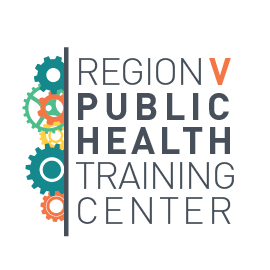Region V Public Health Leadership Institute
Applications are currently closed.
Overview
The Region V Public Health Leadership Institute (RVPHLI) is an opportunity for professionals in public health and primary care to cultivate their capacity to influence change in their organizations and communities. This six-month virtual program is grounded in theory, coupled with practical application and peer-to-peer learning. RVPHLI will set a foundation for both emerging leaders and current leaders to be equipped to be adaptive amid constantly changing circumstances and engage cross-sector partners in addressing the social determinants of health.
RVPHLI is intended for those who are:
- Mid-career (5+ years in public health or primary care) or executive professionals
- Involved in some way in workforce development, community health strategy, and/or performance management
- In managerial, administrative, or clinical roles
- Working within state/local/tribal health departments or Federally Qualified Health Centers & look-alikes
- Serving Medically Underserved Communities, rural areas, Health Professions Shortage Areas, or other high-need areas
NOTE: This program is only available to individuals within the Region V states of Illinois, Indiana, Michigan, Minnesota, Ohio, and Wisconsin.
The cohort will be limited to 38 people from across the region.
Participants apply as individuals.
We also encourage representatives from both public health and primary care in the same community to apply to the same cohort.
Learning Objectives:
By the end of the program, participants will be able to…
- Practice adaptive leadership skills to guide organizational, community, and systems change
- Identify approaches for creating a culture of learning within their agencies
- Apply strategies to foster a supportive workplace culture for their agencies
Format & Time Commitment
RVPHLI will take place over six months, from January – June 2025. Participants will engage in a variety of learning activities, both live and self-paced, for a total of 40 contact hours. New this year, we are incorporating into the program small-group coaching sessions by state. The estimated time commitment is 1-2 hours/week on average over 22 weeks. Participants are expected to contribute orally or via the chat in sessions.
Learning Activities Will Include:
- Self-assessment and goal setting for individual and organizational growth
- Live virtual sessions (13) featuring guest speakers, interactive exercises, and discussion
- Peer-to-peer learning, sharing, and networking during live virtual sessions and on online platform
- Case studies relevant to public health and primary care in Region V
- Three 90-minute live sessions for small group coaching
- The live virtual coaching sessions will occur within the 9am – 11am CT / 10am – 12pm ET window on Feb 20, Apr 17, and May 29.
- Required and recommended reading
- Curated on-demand training based on participants’ interests and goals
- Reflective journaling
Why Participate?
Benefit to participants: RVPHLI is an opportunity for current and emerging leaders to both learn from and share with their peers while expanding their abilities to advance organizational, community, and systems change to ultimately improve population health outcomes.
A Certificate of Completion will be available to those who complete at least 80% of the required activities. After the program, participants will have opportunities to stay connected with alumni.
Benefit to their supervisors/agency: RVPHLI is a no-cost, virtual opportunity to provide professional development and creative growth experiences to your staff, encouraging them to apply new insights to their current and future work at the agency.
Continuing Education Credit
There is no pre-approved CE offered. Participants who complete the program requirements as described below will receive a Certificate of Completion.
We encourage participants to submit their certificate on their own to their accrediting body for continuing education credit but cannot guarantee its acceptance.
Relevant Competencies for Overarching Curriculum
The following competencies will be addressed throughout the course of the program. Competencies reflect selections from these key sources:
- Core Competencies for Public Health Professionals (Council on Linkages Between Academia and Public Health Practice, 2021)
- Strategic Skill Domains (de Beaumont Foundation, 2021)
- Chief Workforce Officer Core Competencies (STAR2 CENTER, 2020)
Planning Committee
RVPHLI is a collaborative effort of the following:
- Region V Public Health Training Center at the University of Michigan School of Public Health
- University of Illinois Chicago School of Public Health
- University of Wisconsin-Madison School of Medicine and Public Health
- University of Minnesota School of Public Health
- The Ohio State University College of Public Health
- Michigan Primary Care Association
- Indiana Public Health Association
- Indiana University Richard M. Fairbanks School of Public Health
- National Network of Public Health Institutes
Have any questions? Please contact us at [email protected]!
